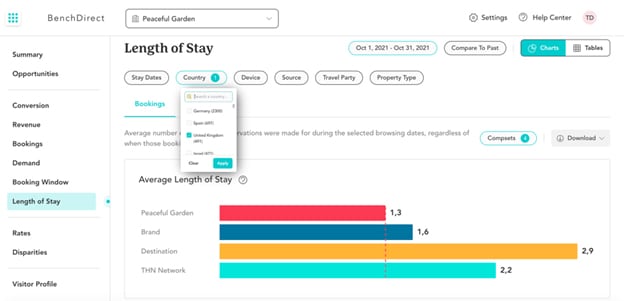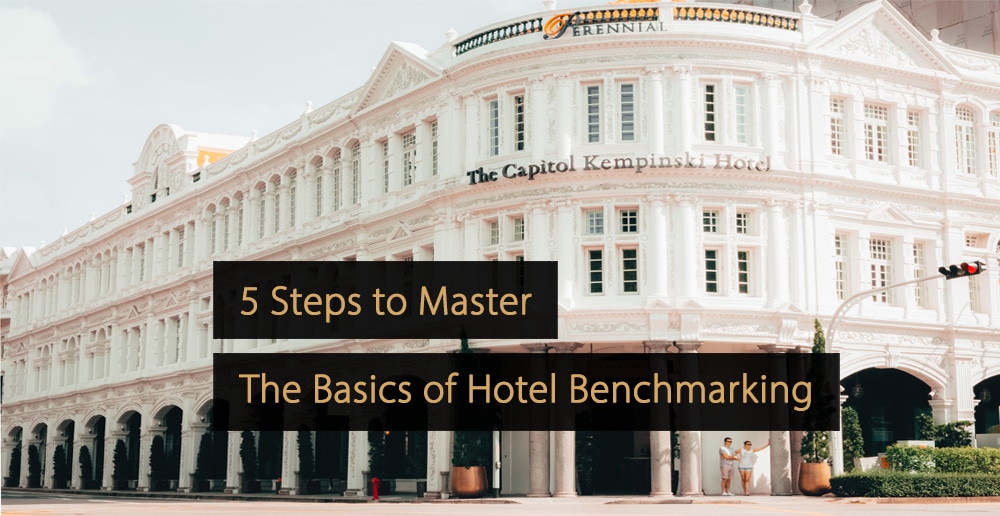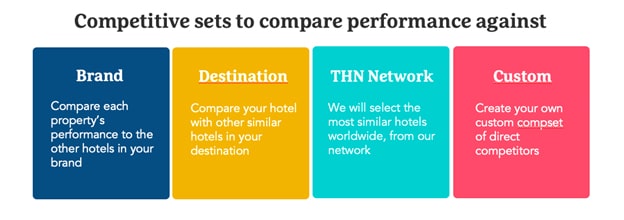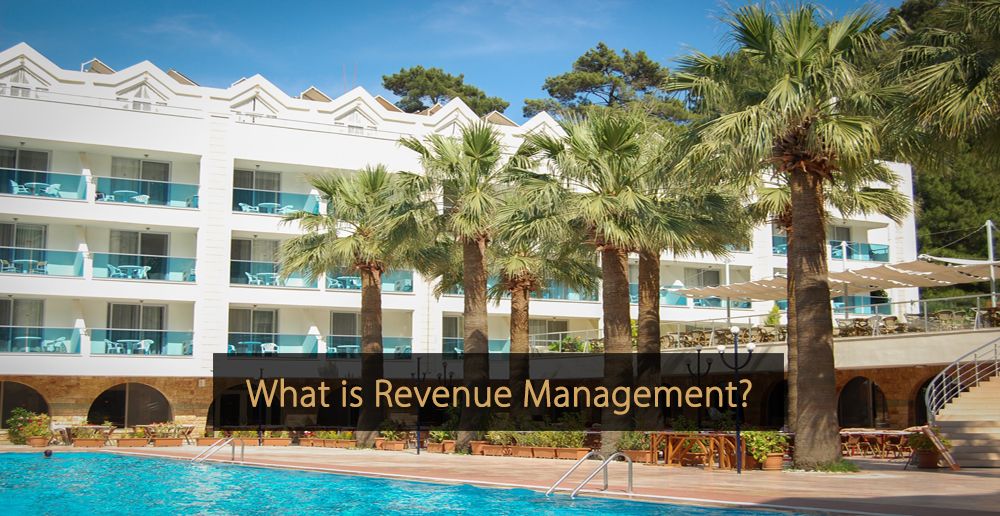Ya sea que su marca hotelera contenga hoteles de lujo de cinco estrellas o departamentos con servicios, tener datos precisos y saber cómo aprovecharlos es fundamental para construir un plan de ingresos hotelero exitoso.
Cuando se trata de implementar una estrategia de evaluación comparativa de hoteles, hay múltiples preguntas a considerar. ¿Cómo defino mis compsets? ¿Qué métricas debo analizar? ¿Cómo hago para interpretar los resultados? En este artículo, puede leer 5 pasos a seguir para estar preparado para implementar una estrategia de benchmarking hotelero.
Herramientas de evaluación comparativa
Para ayudarle a navegar a través de los datos disponibles, puede utilizar una herramienta de evaluación comparativa, como la herramienta de La Red de Hoteles. Las herramientas de evaluación comparativa pueden proporcionar la información más útil, ya que le permiten comprender el desempeño de su hotel y cómo se compara con el mercado y la competencia.
Utilizando los aprendizajes del benchmarking, puedes definir las fortalezas de tu marca e identificar áreas de mejora, brindándote una imagen clara de tu posicionamiento y de cómo puedes diferenciarte de la competencia.
5 pasos para dominar los conceptos básicos de la evaluación comparativa de hoteles
A continuación podrás aprender cómo dominar el benchmarking hotelero en 5 pasos.
1. Comprenda quiénes son sus competidores
El primer paso en la evaluación comparativa es identificar quién es realmente su competencia. Los hoteleros tienden a comparar su desempeño con el de quienes consideran que son sus competidores directos: hoteles similares en el mismo destino. Pero hay otros escenarios a considerar.
En el complejo mundo hotelero actual, es importante pensar más allá de la idea tradicional de un compset e incorporar una visión más dinámica. Puede aprender de otros hoteles similares ubicados en todo el mundo, lo que le permitirá comprender mejor el desempeño de su propiedad. Con este enfoque, se puede pasar de una mentalidad meramente competitiva a una mentalidad de aprendizaje, lo que dará como resultado observaciones y conclusiones considerablemente más ricas.
¿Pero cómo? Por ejemplo, puede comparar sus resultados con propiedades ubicadas en partes del mundo completamente diferentes pero que reciben tipos similares de viajeros y reciben un volumen similar de reservas directas. Esta comparación puede proporcionarle aprendizajes adicionales y permitirle detectar oportunidades que de otro modo habría perdido.
2. Sepa qué métricas comparar
Es fantástico tener acceso a muchos datos del hotel, pero debes tener en cuenta que no todos son relevantes para la estrategia de tu hotel. Debe centrarse en aquellas métricas que pueden afectar significativamente sus resultados y realizar un seguimiento de cómo cambian con el tiempo.
En términos de evaluación comparativa, los hoteleros suelen centrarse en la ocupación y el ADR, pero se pueden considerar muchos otros. Un área interesante en la que profundizar y que no siempre se tiene en cuenta es el rendimiento de su canal directo. La comparación de métricas relevantes en cada etapa del proceso de reserva en línea, como la conversión total del sitio web o la conversión del motor de reservas, puede comprender claramente dónde le está yendo bien y dónde no.
Además, analizar estas métricas de reserva directa le proporciona una imagen mucho más completa porque los resultados se basan en 100% del tráfico de su sitio web, en lugar de solo en el 2-3% que termina reservando.

Duración de la estancia filtrada por el tráfico del Reino Unido
3. Profundice en sus datos competitivos
El cielo es el límite a la hora de analizar datos. Al desglosar los datos de evaluación comparativa de su hotel por ubicación del usuario, fecha de búsqueda o incluso grupo de viaje, puede obtener una comprensión más profunda de las fortalezas y debilidades de su hotel.
¿Necesita un ejemplo de por dónde empezar? Utilizando su herramienta de evaluación comparativa, considere filtrar la duración promedio de estadía para reservas directas en su hotel para una ubicación de visitante específica: Reino Unido. Este filtro es útil para comprobar cuánto tiempo se alojan sus huéspedes del Reino Unido en su hotel y compararlo con sus competidores. Este tipo de información granular proporciona una visión más realista de la situación de su propiedad, lo que le permite identificar exactamente dónde deben ajustarse sus esfuerzos y enfoque de marketing para aumentar los ingresos.
4. Compare los resultados con los períodos anteriores
La evaluación comparativa se basa en el principio de comparar el desempeño. Los resultados se pueden comparar con períodos de tiempo anteriores para que pueda evaluar qué funcionó y qué no funcionó, y comprender cómo llegó a ser así.
Sin embargo, no siempre es óptimo centrarse exclusivamente en datos históricos, especialmente en los tiempos de incertidumbre actuales. Hoy en día, es muy recomendable observar también otros conjuntos de datos, por ejemplo, comparando el desempeño de este mes con el del mes pasado.
5. Tome medidas basadas en conocimientos de evaluación comparativa
Para cosechar los frutos del benchmarking, no basta con analizar los datos competitivos. Tienes que actuar en aquellas áreas en las que has identificado que estás teniendo un desempeño deficiente, pero no debes limitar tu plan de acción. Sería útil que también abordara aquellas áreas en las que tiene un rendimiento superior para explotar aún más sus ventajas competitivas y proponer nuevas ideas que generen ingresos. Como siempre, una vez que haya realizado cambios, es esencial seguir de cerca los resultados y cómo evolucionan.
Marco KPI gratuito: las 10 principales métricas de canal directo para comparar el rendimiento de su hotel
Las reservas directas son fundamentales para el éxito de las marcas hoteleras hoy en día, pero la gestión del rendimiento del canal suele ser insuficiente. Aún así, el valor real proviene de ver cómo se compara su marca con el mercado para poder identificar oportunidades de crecimiento. El análisis de datos puede ayudarle a comprender mejor los resultados de su canal directo.Haga click aquí para descargar el marco de indicadores clave de rendimiento "Evaluación comparativa del rendimiento de su marca hotelera".
Este artículo le proporcionó pasos prácticos para desarrollar un plan de evaluación comparativa para su empresa. Al investigar quiénes son sus competidores, saber qué métricas buscar y cómo compararlas con otras empresas, puede comenzar a tomar medidas para mejorar su negocio y mantenerse por delante de su competencia.
Más consejos para hacer crecer su negocio
Revfine.com es la plataforma de conocimiento líder para la industria de la hospitalidad y los viajes. Los profesionales utilizan nuestros conocimientos, estrategias y consejos prácticos para inspirarse, optimizar los ingresos, innovar los procesos y mejorar la experiencia del cliente.Explore el asesoramiento de expertos sobre gestión, marketing, revenue management, operaciones, software y tecnología en nuestro sitio web dedicado. Hotel, Hospitalidad, y Viajes y Turismo categorías.









Leave A Comment